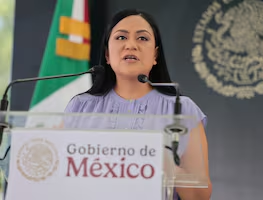Más Información

INE aprueba ampliación presupuestal de 9.2 mdp; se destinará para comprar chalecos en elecciones del Poder Judicial

Sheinbaum anuncia obras de infraestructura en Nayarit; destaca puente que irá de Bahía de Banderas a Puerto Vallarta y un acueducto

Detienen a presunto jefe de célula delictiva allegada a Los Chapitos; se encargaba de narcomenudeo y compra-venta de armamento

“¡Arráncate, Coalcomán!”; así fue la campaña de Anavel Ávila, presuntamente ligada al “Mencho”, para Movimiento Ciudadano

Presupuesto para programas sociales está asegurado en la Constitución: Ariadna Montiel; destaca que se benefician a 320 mil nayaritas

Sheinbaum anuncia construcción de Farmacias del Bienestar en 2025; asegura habrá medicamentos gratuitos para personas vulnerables
Drug lord Héctor "El Gero" Palma, one of the founders of the Sinaloa Cartel, returned to his native Mexico after serving almost a decade in a U.S. prison and was immediately transported to another maximum-security lockup where he will await trial for two murders.
U.S. authorities handed over Palma in Matamoros, across the border from Brownsville, Texas, according to a statement from the Mexican Attorney General's Office. Palma had been released from federal prison in California on Friday and put into the custody of U.S. immigration officials.
The drug lord was flown to Mexico City late Wednesday and then transported to the Altiplano prison outside the capital, the same prison that Sinaloa Cartel leader Joaquín "El Chapo" Guzmán escaped from in 2015.
Palma was detained under an arrest order from the western state of Nayarit.
He is accused of ordering the 1995 killings of a deputy police chief and a person who was with the officer, a federal official with knowledge of the case told The Associated Press on Thursday. The official was not authorized to discuss the case publicly and spoke on condition of anonymity.
The person said the deputy police chief apparently worked for the Sinaloa Cartel but decided to switch loyalties to the Arellano Felix brothers of the Tijuana Cartel, and allegedly was killed in retaliation.
If authorities had not brought charges against Palma, he would have gone free.
Palma was arrested in June 1995 in western Mexico and later extradited to the U.S. where he pleaded guilty to cocaine trafficking charges and was sentenced to 16 years in prison. The U.S. Embassy said Palma received early release for good behavior.
Some experts believed that Palma could have returned to drug trafficking if allowed to walk free, but would have faced a world that has changed since he helped Guzmán found the Sinaloa cartel in the early 1990s.
"He could try to get involved, but I don't know how directly," said Mexico City-based security analyst Alejandro Hope. Palma may have lost much of his money and his connections since he was arrested following a plane crash.
Once released, he could have just disappeared into Mexico's hinterlands, "just like Caro Quintero," Hope noted, referring to the last major old-guard drug lord released, Rafael Caro Quintero.
Freed by apparent judicial misconduct in 2014, and currently sought on a re-arrest warrant, Caro Quintero hasn't been seen since. Given that he participated in the 1985 torture-slaying of U.S. DEA agent Enrique "Kiki" Camarena, Caro Quintero's release was a major embarrassment for the Mexican government.
Palma's return threatens to be another headache.
Even before he was extradited to the United States in 2007, Palma had compiled an excellent track record of beating charges in Mexico. He was acquitted, or had the charges dismissed, for accusations including multiple counts of murder, kidnapping, robbery and drug possession.
In Mexico, Palma, known as "El Güero" for his fair hair, served only a 2 1/2-year sentence for minor convictions including weapons violations.
He essentially fell into the hands of law enforcement in 1995 when his plane crashed.




